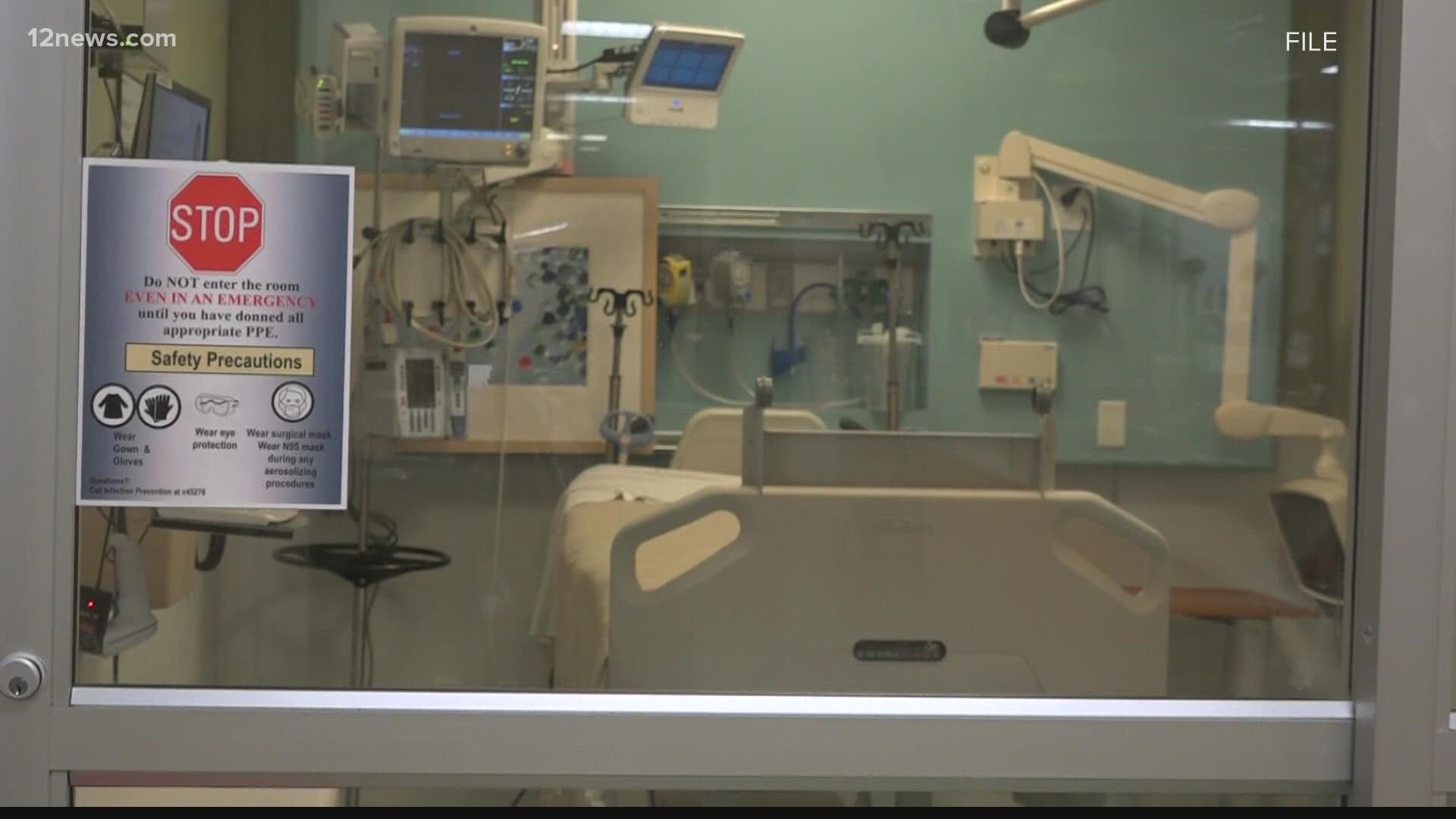ARIZONA, USA — More than 18,800 new cases of COVID-19 are being reported Wednesday in Arizona by the Arizona Department of Health Services.
It’s a record high reported by ADHS, however, doctors and public health experts said that there are likely many more cases not reported because of at-home testing.
In the midst of the surge, one of the effective treatments proved to help lower the risk of hospitalization and death is still in short supply.
Monoclonal antibody treatments
Last month, the U.S. Department of Health and Human Services paused the shipments of the two monoclonal antibody treatments that have been found not to be effective against omicron. Leaving Sotrovimab as the only remaining monoclonal antibody treatment against the omicron variant.
“Monoclonal antibodies are available in limited supply nationwide,” Jessica Rigler, the Assistant Director for the Division of Health Preparedness with AZDHS said.
Rigler said Arizona is expected to be receiving about 730 courses of Sotrovimab from the federal government every week for the next several weeks. Those courses are then divided up around the state to the facilities and providers administering them.
In short supply
The monoclonal antibodies are only available to certain populations under the emergency use authorization granted by the Food and Drug Administration, meaning most people are considered at higher risk for being hospitalized from COVID-19.
Valleywise Health Chief Clinical Officer, Dr. Michael White, said his medical center had about two days worth of supply on hand of Sotrovimab left from the allotment given to them currently.
Banner Health’s Chief Clinical Officer Dr. Marjorie Bessel said Tuesday her three facilities in the Valley providing the treatments only had about a two-day supply left as well.
“Due to the limited supply at this time, not all eligible patients will receive the treatment,” Bessel said.
Dr. Stephen Finberg, a pulmonologist in the Valley at Desert Center for Allergy and Chest Diseases said he’s had patients who have not had their COVID-19 booster shot, and have had to go to the emergency room with COVID.
“Those patients, if oxygen is down, get admitted,” Finberg said. “But the emergency rooms don’t have the drug to give them, which is the monoclonal antibodies.”
Requesting additional help
Previously, the Maricopa County Department of Public Health had planned to open sites with FEMA assistance to administer the monoclonal antibodies and relieve some pressure off of hospitals in the county.
The sites requested assistance from FEMA to open in conjunction with facilities, like Valleywise Health. However, White said the teams from FEMA were prepared to administer the monoclonal antibodies that are not as effective against the Omicron variant, which is given with an injection, and not Sotrovimab, which is administered with an IV.
Rigler said the state is working to get support from FEMA still.
“We've worked with our local partners to revise some of our requests to the federal government to see if they may be able to send some teams here that could support IV infusions,” Rigler said. “And that would help ensure that we're alleviating some of that burden from our hospitals that are already stretched so thin here in Arizona.”
Maricopa County Department of Public Health spokesperson Sonia Signh said the county was working with AZDHS to not only get the teams for monoclonal antibody infusions but support the COVID-19 testing sites too.
Antivirals arriving
Rigler said antiviral pills like those from Pfizer and Merck have also started arriving in Arizona.
Currently, Rigler said the department is anticipating about 1,700 courses of Pfizer’s pill and about 6,800 courses of the Merck pill every two weeks.
“These are smaller quantities when you think about how many people in Arizona are positive for COVID right now,” Rigler said. “However, many of these antiviral treatments, particularly the Pfizer treatment can be very effective for individuals at high risk for severe disease progression.”
Rigler said because of the limited supply, the pills are being prioritized to people who are 70-years-old or older, or who have severe immunocompromising conditions and encouraged people to ask their doctors for both the monoclonal antibody treatments and antiviral pills if they might be eligible to receive them.
Locations for where the treatments can be found across the state are listed here.
COVID-19 News and Updates
Subscribe to the 12 News YouTube channel to receive notifications on the latest videos about the latest information on the coronavirus.

